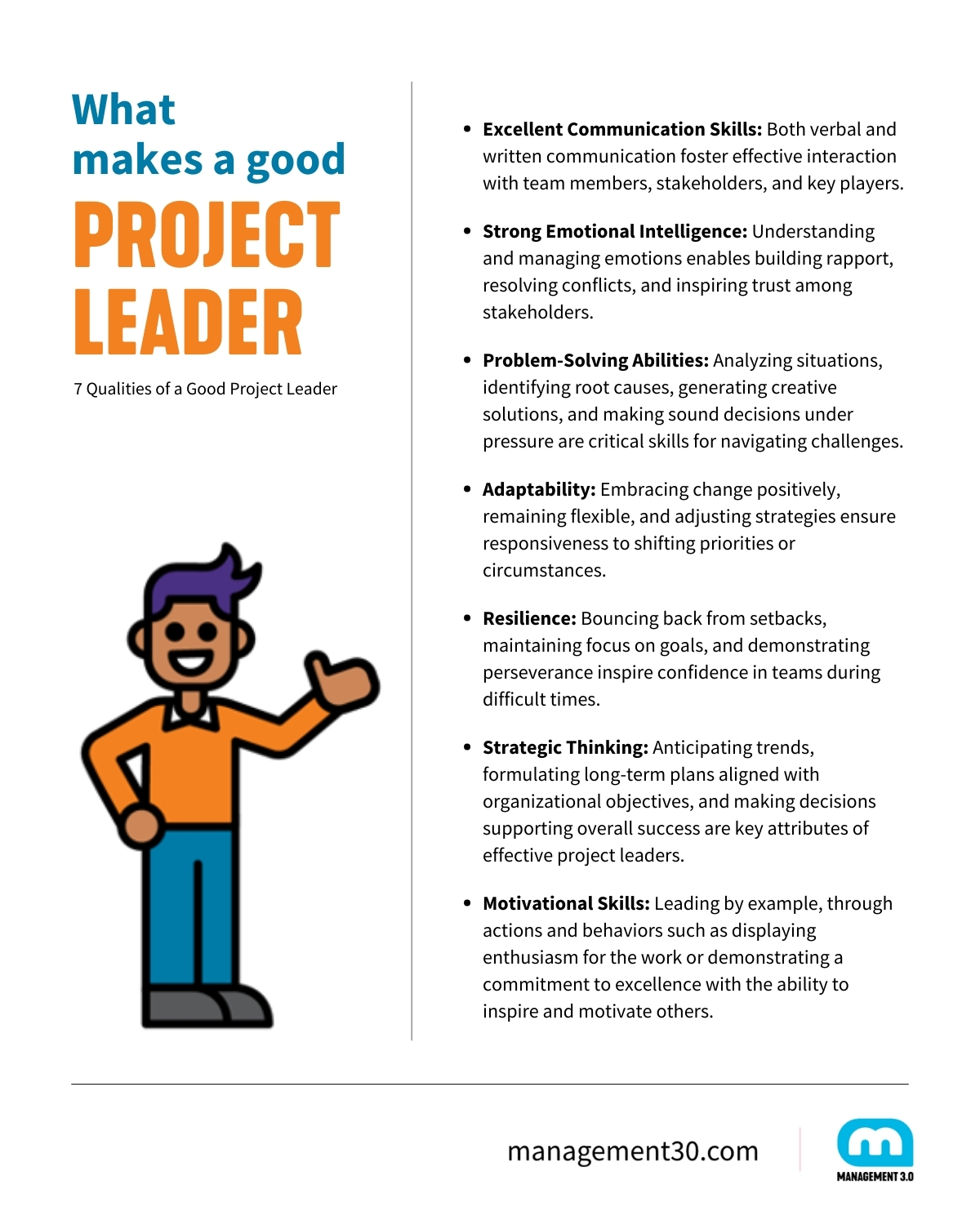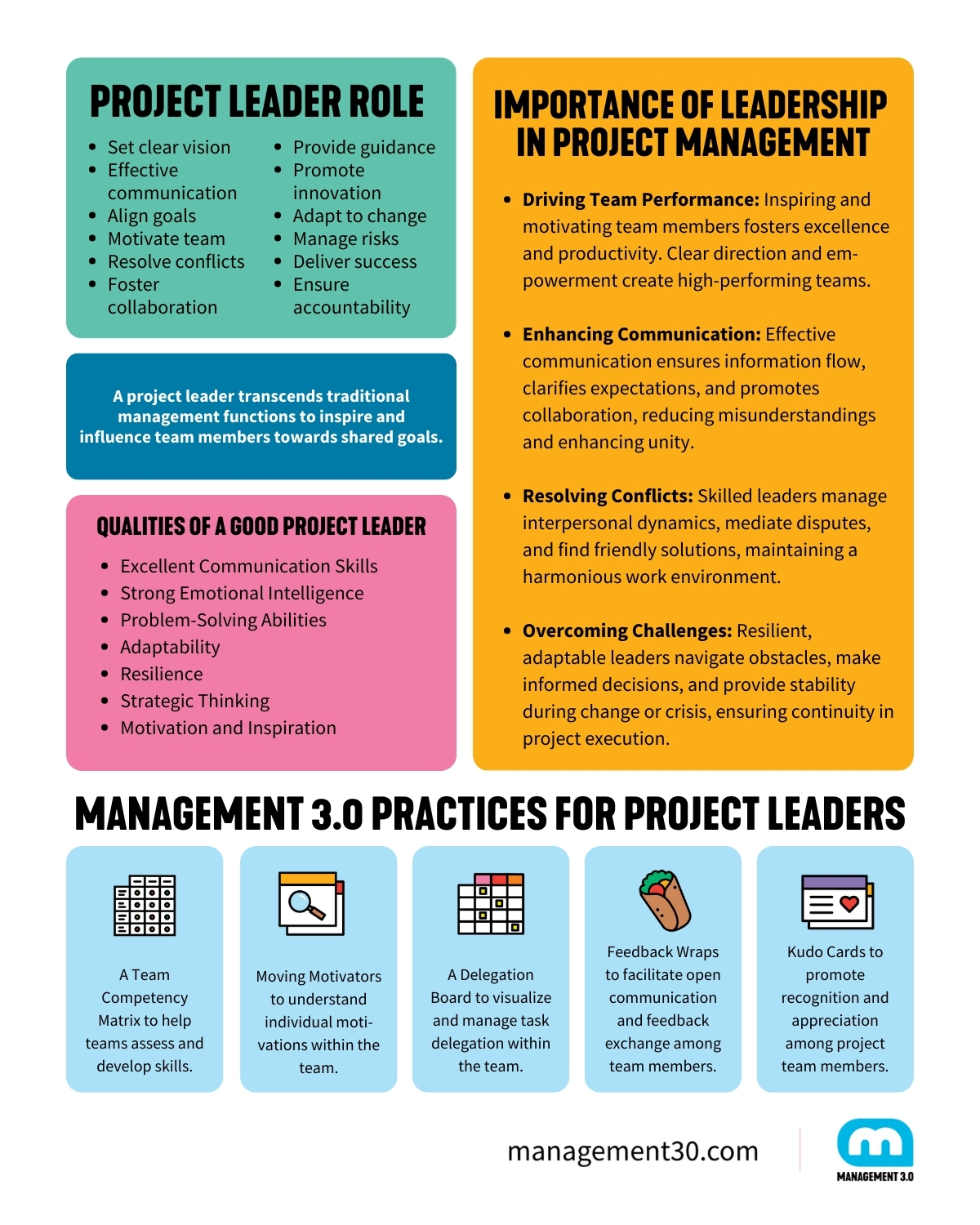By Luis Angenscheidt, a Management 3.0 facilitator from Uruguay, with a technical background in infrastructure and cloud, and a passion for agile leadership. In this article, he will discuss leadership skills for project managers and how Management 3.0 can help in becoming a better project leader. He will provide his own definition of project leadership and explore its impact on people, systems, and teams.
I have been working in management for over the last 16 years. During this time, I have seen a lot! And had the opportunity to work and learn from a very big number of people. Every company is a different world, every group of people has new ways of working, new ideas and new manners. As for that, I have learned that influencing everyone around one is key so that the group grows and fosters.
What Is Project Leadership?
Project leadership is a critical aspect of project management that focuses on guiding and inspiring a team towards achieving project objectives. It involves setting a clear vision, motivating team members, making strategic decisions, fostering collaboration, and ensuring project success. A project leader plays a pivotal role in driving progress, resolving conflicts, and creating a positive team culture that promotes innovation and high performance
What Is the Difference Between a Project Manager and a Project Leader? Is There Any?
Indeed, there are differences between these two roles. While both are vital for project success, they entail distinct responsibilities and skill sets:
Project Manager
A project manager primarily focuses on planning, organizing, and controlling project activities to achieve specific objectives within constraints such as time, cost, and scope. They oversee task execution, resource management, progress monitoring, and ensure deliverables align with the project plan.
Project Leader
A project leader transcends traditional management functions to inspire and influence team members towards shared goals. They concentrate on people-oriented leadership aspects like motivating individuals, fostering teamwork, nurturing relationships, resolving conflicts, and cultivating a positive work environment. Acting as mentors, coaches, and visionaries, project leaders empower team members to excel and contribute effectively to project success.
What Is the Role of a Project Leader?
The role of a project leader is multifaceted, encompassing various responsibilities crucial for project success. They are accountable for setting a clear direction and vision, effectively communicating with stakeholders and team members, and aligning team goals with organizational objectives. Additionally, they motivate and inspire team members to perform optimally, resolve conflicts, and address challenges throughout the project lifecycle.
A project leader plays a vital role in fostering collaboration among team members, promoting innovation and creativity, and providing guidance and support when needed. They ensure accountability and transparency in project activities, adapt to change readily, and proactively manage risks to deliver successful outcomes that meet stakeholder expectations.
In essence, the role of a project leader is pivotal in driving team performance, fostering a culture of excellence, promoting continuous improvement, and ensuring successful project delivery. Effective project leadership is indispensable for navigating complexities, overcoming challenges with resilience, building high-performing teams, and achieving desired outcomes in today’s dynamic business environment.
Why Is Leadership in Project Management Important?
Leadership in project management is paramount, playing a crucial role in driving team performance, enhancing communication, resolving conflicts, and overcoming challenges effectively. Strong leadership fosters trust among team members, promotes accountability, encourages innovation, and ensures alignment with organizational goals. Effective project leadership empowers managers to navigate complexities, adapt to change, and deliver successful outcomes amidst uncertainty.
One key reason for the importance of leadership in project management lies in its impact on team performance. A strong project leader inspires and motivates team members to excel, fostering a culture of excellence and driving productivity. By providing clear direction, setting high standards, and empowering team members, project leaders cultivate high-performing teams capable of achieving exceptional results.
Furthermore, effective leadership is vital for enhancing communication within the project team and with stakeholders. Project leaders adept in communication skills ensure that information flows freely, expectations are clear, and feedback is constructive. Clear communication fosters collaboration, reduces misunderstandings, and promotes unity among team members, ultimately leading to improved results.
In addition, leadership in project management is crucial for resolving conflicts that may arise. Skilled project leaders manage interpersonal dynamics, mediate disputes, and find amicable solutions to conflicts threatening project progress. By promoting a culture of respect, empathy, and open dialogue, project leaders create harmonious work environments where differences are addressed constructively, maintaining team cohesion.
Moreover, effective leadership is essential for overcoming challenges and uncertainties inherent in complex projects. Project leaders who demonstrate resilience, adaptability, and strategic thinking navigate obstacles confidently, make informed decisions under pressure, and lead teams to successful outcomes amidst adversity. Strong leadership provides stability and direction during change or crisis, instilling confidence and ensuring continuity in project execution.
Project Leadership Skills: What Makes a Good Project Leader?
Project leadership skills encompass diverse attributes that distinguish effective project leaders. Key qualities include excellent communication skills – both verbal and written – enabling impactful interaction with team members, stakeholders, and other project stakeholders.
Additionally, strong emotional intelligence enables project leaders to understand and manage their own emotions and those of others within the team, fostering rapport, resolving conflicts diplomatically, and inspiring stakeholder trust.
Problem-solving abilities are another essential skill for effective project leadership. Critical thinking, objective evaluation of options, and creative solution generation under pressure are vital for navigating project challenges while maintaining alignment with project goals.
Adaptability is crucial in today’s dynamic business environment, enabling project leaders to respond positively to shifting priorities, unforeseen circumstances, and evolving project requirements. Embracing change, remaining flexible, and adjusting strategies as needed ensure project success.
Resilience is also vital, allowing project leaders to bounce back from setbacks, learn from failures, and maintain focus and positivity in the face of adversity. Demonstrating perseverance, optimism, and determination inspires confidence in the team, fostering resilience across project challenges.
Strategic thinking is key, enabling project leaders to anticipate trends, formulate long-term plans aligned with organizational objectives, and make decisions supporting overall project success. Balancing strategic vision with attention to detail in executing plans ensures effective project leadership.
Another hallmark of a good project leader is the ability to inspire and motivate others. Leading by example, through actions and behaviors such as displaying enthusiasm for the work or demonstrating a commitment to excellence, good project leaders inspire team members to emulate these qualities. Additionally, motivating team members by recognizing their contributions and providing opportunities for growth and development fosters engagement and commitment within the team.

In conclusion,
Leadership skills are essential for success in project management as they enable them to inspire teams.
How Can Management 3.0 Tools and Practices Help to Become a Better Project Leader?
Management 3.0 offers a modern approach to leadership, empowering project managers to excel as leaders by providing a set of tools and practices designed to enhance team collaboration, foster innovation, promote continuous improvement, and adapt to change in dynamic project environments. By embracing Management 3.0 principles, project managers can develop the skills needed to become effective leaders who inspire teams, drive project success, and navigate complexities with confidence.







